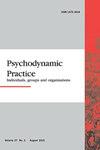Suffering in silence: a psychodynamic exploration into the lived experience of student opera singers in a time of Covid
IF 0.4
Q4 PSYCHOLOGY, CLINICAL
引用次数: 0
Abstract
Concert halls fall silent, audiences vanish. Daily practice, nightly performance and a lifetime’s dreams vaporise as COVID-19 plunges the UK into lockdown. Yet everywhere there is the echo of tumultuous applause as front-line NHS teams take centre stage. The old audience is the new star; the nation’s 50,000 singers, dancers and actors side-lined. ‘Nothing is more devastating to a performing artist than not having the chance to be on stage’, writes Plaut (1988, p. 114). So how might a performer experience being in a world in which performance has ceased to exist? How might a singer with an inescapable instrument make sense of their thoughts and feelings when the once-prized voice is now malign, every breath toxic? This was the focus for my psychodynamic study, one of the first into the lived experience of young singers in a time of Covid. Student opera singers embarking on a solo career and cut off from their conservatoire training and peers while still negotiating adolescence provided a tight focus. Much of the research into musicians pre-Covid focuses on music performance anxiety (MPA) and its treatment, which perhaps suggests a collective gaze that views creative artists as commodities rather than as persons to be understood. Performers are there for our pleasure and an enjoyment of opera particularly can be understood as an intensely erotic experience (Abel, 1996; Poizat, 1992) that we may prefer not to acknowledge. Perhaps when performers could no longer perform in a time of Covid they attracted our collective rage and fear to become worthless objects. After a lifetime’s training, participants in my study found themselves ‘left over from society’ and alone. The crucial well-being performers bring to society was also lost; the power of music to transform separateness into ‘authentic togetherness’ (Zuckerlandl, 1973) for singer and audience alike. Seven participants aged 25–30 were recruited from UK conservatoires for individual hour-long interviews. These were anonymised and transcribed for the study, which used a framework of Interpretive Phenomenological Analysis seen through a psychodynamic lens. My research aims to help therapists better understand and support this under-researched group. It has relevance for how沉默中的痛苦:对新冠肺炎时期学生歌剧演员生活经历的心理动力学探索
本文章由计算机程序翻译,如有差异,请以英文原文为准。
求助全文
约1分钟内获得全文
求助全文
来源期刊

Psychodynamic Practice
PSYCHOLOGY, PSYCHOANALYSIS-
CiteScore
0.90
自引率
0.00%
发文量
41
期刊介绍:
Psychodynamic Practice is a journal of counselling, psychotherapy and consultancy and it is written for professionals in all fields who use psychodynamic thinking in their work. The journal explores the relevance of psychodynamic ideas to different occupational settings. It emphasizes setting and application as well as theory and technique and focuses on four broad areas: •Clinical practice •The understanding of group and organisational processes •The use of psychodynamic ideas and methods in different occupational settings (for example, education and training, health care, social work, pastoral care, management and consultancy) •The understanding of social, political and cultural issues
 求助内容:
求助内容: 应助结果提醒方式:
应助结果提醒方式:


